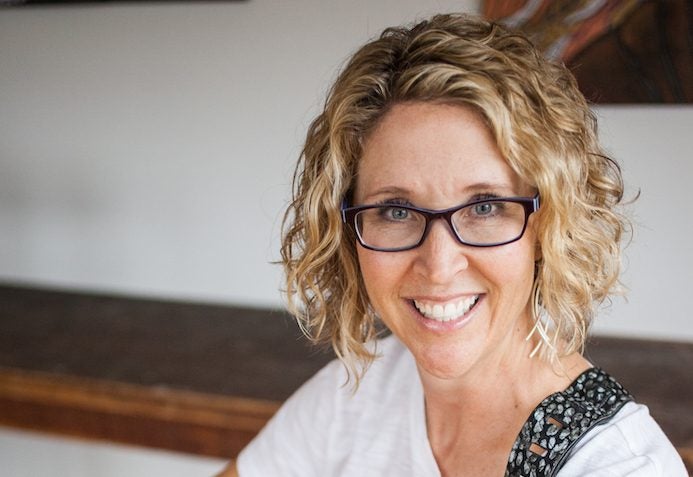Seeking Connection: Life is lumpy, so be mindful
Published 9:55 am Monday, April 15, 2019

- Erin Smith is the owner of the OM place in Winchester, the author of “Sensible Wellness” and the online host of the OM channel. Follow her on Twitter @erinsmithauthor.
My boarding zone said, “Basic,” which is Delta’s way of saying “dead last on the aircraft.”
There were 12 rows on this commuter to Columbus, and I was seated in 11A by the window.
As I walked down the aisle, 11B glanced up from his laptop and glared. I could tell he was hoping I was sitting in 7D, the only other empty seat on the plane.
He got up reluctantly to let me in. But not before I heard him sigh heavily and caught him rolling his eyes.
I am a lovely person to sit beside on a plane. I wasn’t coughing or carrying a wailing infant. I’m small and I never use the armrest.
If you’re a talker, I’m happy to swap stories. And if you need to bang away on your laptop for the duration of the flight, I’m equally happy to listen to an Audible.
I smiled, but this guy wasn’t having it. I peeked at his laptop, surmised he was a claims adjustor.
His shirt was emblazoned with Westfeld Insurance Group and his computer screen read, “Insurance Claim Denied.” So I popped in my headphones and closed my eyes.
Neil Gaiman started to whisper Norse myths in my ear and I drifted away.
Soon enough, we were airborne. I felt the steep incline of the plane, then a very sudden drop, followed by some alarming turbulence.
A message came over the intercom, but I still had my headphones in and didn’t hear it. My seat started bucking as if the bolts were coming loose.
My eyes popped open to see the flight attendant running down the aisle. My heart froze in terror.
I yanked out my headphones, turned around to see the woman behind me in convulsions. Her knees were kicking my seat so hard it threw me forward.
“I’m a doctor!” one man yelled. “Is anyone traveling with this woman?”
A younger version of the woman having a seizure made her way to the back of the plane, tears streaming down her face. “I’m her daughter! She has brain cancer! We’re on our way to James (Ohio State’s famous cancer center)!”
Another stewardess brought the oxygen tank from the front. We all felt the plane bank sharply, then the pilot announced we were returning to the gate.
As this is a family newspaper, I am forbidden to share the exact word that man beside me uttered. But it started with an F.
Twenty minutes later, we were back on the ground and paramedics were wheeling the lady down the aisle to the waiting ambulance.
I silently sent out a prayer to the poor woman and her family.
While we waited to take off again, the man to my right texted furiously, then made a call and told someone he would be about an hour late.
Then he looked at me and growled, “I did not need this inconvenience today.”
I took a deep breath and held his gaze with a steely one of my own. “I’m guessing,” I said slowly, enunciating each word carefully, “that she probably finds brain cancer to be an inconvenience too.” Then I smiled sweetly and turned away, completely finished with this awful man.
This man didn’t recognize the difference between an inconvenience and a problem.
Unitarian minister Robert Fulghum writes, “If you break your neck, if you have nothing to eat, if your house is on fire, then you’ve got a problem. Everything else is an inconvenience. Life is inconvenient. Life is lumpy. A lump in the oatmeal, a lump in the throat and a lump in the breast are not the same kind of lump. One needs to learn the difference.”
I don’t ever want to become a person that values my schedule over someone’s life.
Petty annoyances are perfect opportunities to practice the mindful minute, turning a reaction into a response.
With present moment awareness, we can notice an impulse before it becomes an action.
If my angry seatmate had used the extra time to take just 10 mindful breaths instead of pecking furiously on his phone, he might have calmed his nervous system enough to see outside of his own selfish desires.
We do not choose our thoughts but we do choose what we do with them.
Noticing you feel inconvenienced is completely natural. Choosing to feel angry and victimized when someone’s life is on the line is just a bad habit.
Thoughts of all sorts arise spontaneously, but we decide how long they stay and how we respond to them.
The mindful minute is a coping mechanism for life. When angry, breathe mindfully. When inconvenienced, breath mindfully. When hungry, tired, late, overwhelmed, scared, doubtful, nervous or upset in any way, breath mindfully.
Taking the time to count 10 breaths can be hard in stressful situations, but it helps us differentiate between real problems (like brain cancer) and minor inconveniences (like a delayed plane).
Erin Smith is the owner of the OM place in Winchester, the author of “Sensible Wellness” and the online host of the OM channel. Follow her on Twitter @erinsmithauthor.



